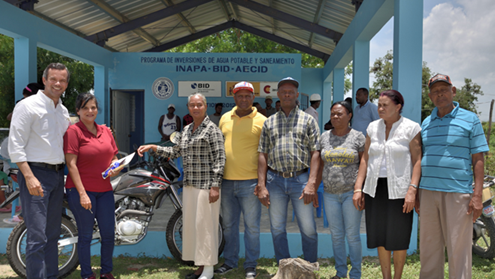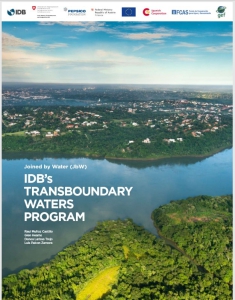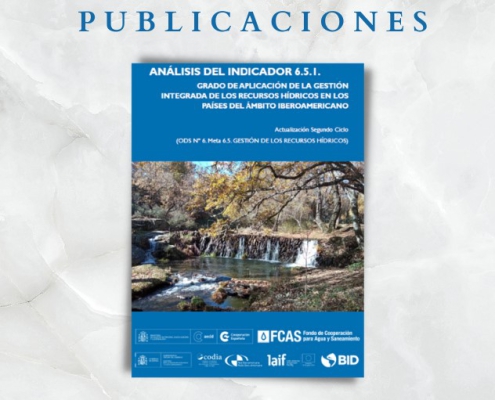Cooperations With funds from the Cooperation Fund for Water and Sanitation
Technical cooperation carried out through the IDB with FCAS funds
Technical cooperation carried out through the IDB with FCAS funds

As well as the programmes that the Cooperation Fund for Water and Sanitation has implemented through the IADB, various technical cooperation projects have also been carried out with the aim of supporting the sustainability of the actions that are already underway, or to take advantage of the knowledge generated for the development of future projects in the areas of Human Rights to Water and Sanitation, Gender, IWRM and governance of the sector.
Three new Technical Cooperations were approved in 2021 (to begin implementation in 2022), in addition to the eight already being implemented, bringing the total portfolio to 11 interventions. In addition, work is underway on two more, with the aim of approving them in 2022.
Firstly, the new partnerships approved in 2021 are described. This is followed by those already in place in 2020, noting specific progress made in 2021.
1.- Desalination as a Water Resource Alternative in the LAC Region (300,000 US dollars). Approved in 2021
The objective is to identify opportunities and keys for the development of desalination alternatives in the LAC region, within a context of water stress and climate change. The possibilities will be analysed to determine where the region stands and to propose possible uses, taking into account the analysis of other Community options and alternatives and emphasising aspects relating to the sustainability of the systems and environmental commitments. The intervention will reinforce the IWRM issue and will focus on a line of great potential for development, in which Spain can have an important added value.
2. Support for the Development of National Drinking Water and Rainwater Drainage Plans in Uruguay (200,000 US dollars). Approved in 2021
This operation aimed to support the Government of Uruguay in the drafting of the National Drinking Water Plan (PNAP) and the National Stormwater Drainage Plan (PNDP) by carrying out sectoral studies that contribute to the improvement and universalisation of drinking water, stormwater drainage and sanitation services. In the drinking water component, an estimate will be made of the economic and financial costs of the infrastructure necessary to universalise access to drinking water for the rural population, with emphasis on rural schools, as well as other studies necessary to universalise the service. In the drainage component, DINAGUA will be assisted in the development of the National Rainwater Drainage Plan (PNDP). In the sanitation component, assistance will be provided to DINAGUA in the development of the Strategies for Adequate Sanitation in Coastal Areas.
The TC arises from the need to give continuity to the programme “Adaptation Plan for Integrated Water Resources Management”. It has just been approved and is being prepared for implementation.
3. Promotion of Policies and Mechanisms for the Fostering of Innovation in the Water, Sanitation and Solid Waste Sector in LAC (125,000 US dollars). Approved in 2021
It aims to foster sectoral innovation through the identification of possible improvements in policy and governance mechanisms and the development of tools to facilitate the strategic management of innovation and foster an innovative culture in the water and sanitation sector. It is hoped that by publishing these methodologies and tools, knowledge will be produced to benefit central and municipal governments in the region.
The scope of this cooperation goes beyond the purely technological aspect, focusing on the identification of issues related to strategic management and social innovation. This intervention will promote institutional strengthening and focus on a key aspect for the development of the sector -innovation- from a perspective of great interest to Spanish Cooperation: public policy. The proposal was approved at the end of 2021 and is being prepared for implementation.
4. Support for the Implementation of Reforms and Institutional Strengthening of the Water and Sanitation Sector in Paraguay (1 million US dollars). (PR-T1268)
This Technical Cooperation began implementation in October 2019 with the aim of supporting the design of the necessary actions to carry out the reforms and the strengthening of the sector’s governing authority. During 2021, the preliminary engineering projects for the Drinking Water and Sanitation Programme for the Metropolitan Area of Asunción – Lambaré River Basin (joint operation with FONPRODE) were completed. Within the planning support line, the Ministry of Public Works and Communications of Paraguay is being accompanied in a methodology for prioritising investments and has supported the preparation of performance-based contracts that include construction and operation support. A review of the Regulatory and Tariff Framework was conducted and improvements to the regulations and their application are being defined. With regard to service provision, work is underway on a Service Development Plan that includes goals and strategies for the development and sustainability of the sector. Progress has been made in the policy framework on sewage connectivity strategies.
The Programme also includes the promotion of long-term investment planning and the development of efficient projects for the metropolitan areas of Asunción and Ciudad del Este.
5. Local Strengthening for the Use of Dry Ecological Toilets - Bolivia (100,000 US dollars). T1353
The aim is to promote the use of ecological toilets in rural areas of Bolivia by developing a social strategy. In addition, it is intended to serve to consolidate a line of work that will serve as a model for new rural operations being developed in Bolivia.
It was approved by the AECID in December 2019, and suffered several delays throughout 2020 due to COVID-19, which prevented field visits. In 2021, initial activities began with coordination meetings involving technicians from the Vice-Ministry of Drinking Water and Basic Sanitation (VASPB) and supervision. A consensus has been reached on the 24 communities where the study will be implemented, which include communities from the AECID’s BOL-003-M Drinking Water Supply and Sanitation in Small Rural Communities Programme in Bolivia.
6. Systematisation of Experiences and Support to the Development of Strategies in the Rural Water and Sanitation Sector - REGIONAL (200,000 US dollars). RG-T3422
Improving services in rural areas is one of the Fund’s priorities and the objective of this TC is to contribute to promoting access to safe water and sanitation services in the rural sector in Latin America and the Caribbean through the development of strategies based on the analysis of experiences and in the framework of the SDGs and Human Rights to Water and Sanitation (HRWS), with a special emphasis on service sustainability schemes. These resources complement 300,000 dollars from the Regional LAIF. In 2021, support to the operation HO-L1213 – Honduran Rural Water and Sanitation Programme was completed by defining a sustainability strategy. Regional cost analysis of rural projects and support to SENASA in Paraguay for the development of a project monitoring tool are being finalised.
7. Capacity-Building of Small Water and Sanitation Service Operators in the Region - REGIONAL (500,000 US dollars). RG-T3915
This regional cooperation aims to promote the sustainability of water and sanitation services by supporting small operators. This support will be carried out by developing tools and assisting specific operators.
These resources complement 250,000 dollars from the Regional LAIF programme and come from a previous Technical Cooperation (RG-T3507 – Capacity-Building of Operators as a Key Aspect for the Sustainability of Water and Sanitation Services in the Region – Regional), which had to be cancelled due to difficulties in its execution as a result of COVID. However, the resources have been earmarked for this new operation, which continues the actions that were not carried out.
The preparation of the free online course “Water 2.0: Efficient Companies for the 21st Century”, which aims to strengthen knowledge and capacities for the management of water companies, has also been supported, and the diagnosis of some small operators has been carried out in order to prepare their improvement plan.
In 2021, work was carried out to contract consultancies in order to support the improvement plans, the diagnosis of the training offer and support for coordination.
8. RG-T3489 - Transboundary Water Resources: A Water Safety Framework for Transboundary Basins in LAC - Regional (500,000 US dollars). RG-T3489

This initiative aims to support the development of transboundary water management models by means of tools that enable diagnoses and scenarios for shared water resources management and hydrological planning that minimise conflicts over the use of the resource and allow for resilient and sustainable management planning.
Transboundary issues are a fundamental aspect for the implementation of integrated water resources management in the region, and this is one particular aspect that the Fund wants to focus on. These resources complement a further 800,000 US dollars from the Regional LAIF. Up to now, work has been carried out to prepare the analyses to be conducted in the Pantanal, the Amazon and the Trifinio and progress has been made in the development of the scenario model of the Water-Energy-Food Nexus in the Amazon Basin.
9. Promoting Gender Equality in the Water and Sanitation Sector - Regional (500,000 US dollars). RG-T3596
This initiative aims to define and develop lines of action that promote gender equity in the water and sanitation sector through specific approaches and tools. In 2021, we supported the development of a Gender and Diversity Module for the Aquarating tool (the rating agency for the evaluation of water and sanitation utilities), which is being tested in two operators, EPMAPS (Quito) and AySA (Buenos Aires). Based on this, the tool will be scaled up with at least five other operators.
10. Support for Actions Developed in the Framework of the Regional Codia (100,000 US dollars). RG-T3711
This cooperation was launched to support the Conference of Ibero-American Water Directors (CODIA) in the development of strategic actions for the sector in the field of hydrological planning, integrated water resources management and capacity-building.
Among other activities, the virtual course “Natural Water Management Solutions” was held in June 2021; the High Level Seminar on Transboundary Water Management in the Countries of the CODIA area and the Technical Dialogues “Progress and Challenges in Transboundary Water Management Cooperation within the Framework of SDG6 Fast-Tracking Applied to SDG Target 6.5 and Its Indicator 6.5.2” held at the XXII CODIA from 3rd to 5th November 2021 were supported. The Analysis of Indicator 6.5.1 – Degree of Implementation of Integrated Water Resources Management in Ibero-American Countries – was also published with a second cycle update, and coordination with RALCEA was reinforced to promote training.

Direct access to the Indicator Analysis 6.5.1. here.
11. Development of Strategies to Provide Water, Sanitation and Hygiene Services in Informal Settlements. Regional. 1,000,000 US dollars
This intervention aims to support partner countries in defining strategies to ensure essential services in informal urban areas with high health vulnerability. For this porpose, diagnoses, action plans and pilot projects will be developed, taking into account urban conditions, alternatives for providing water and sanitation services, the legal and regulatory framework, and successful experiences. These guidelines will help define policies and programmes aimed at guaranteeing services in these areas and closing the gaps in coverage. The proposal includes the COVID-19 perspective and will reinforce the Human Rights aspect of Water and Sanitation.
In 2021, the contracting process for the regional diagnosis began, preparations began for an e-hackathon (a programmers’ meeting) to offer solutions to informal settlements; the diagnosis of the provision of water, sanitation and hygiene services in the informal settlements of the Metropolitan Area of Asunción began and the actions to be developed in Colombia are being defined.
Cooperation Fund for Water and Sanitation
Av. Reyes Católicos 4 – 28040 Madrid
dfcas@aecid.es
